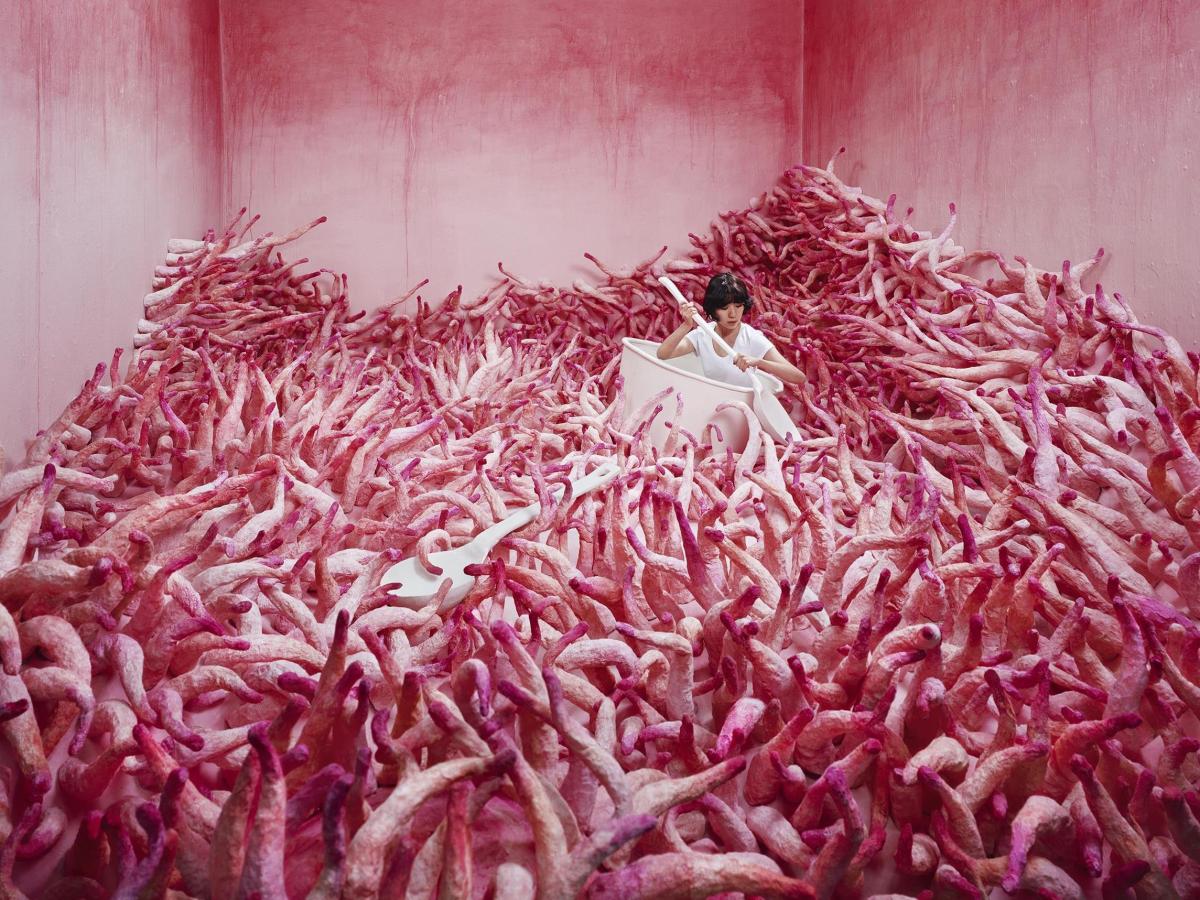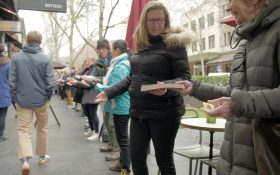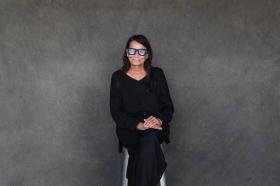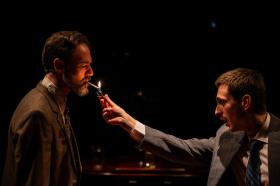JeeYoung Lee’s Monsoon Season, 120x96cm, Inkjet print, 2011. Supplied.
In our turbulent age, the arts can lead the way in helping people grapple with the impact of change. Art also provides us with fresh perspectives – fostering empathy and challenging our stereotypes about the world.
‘As the make-up of our population continues to change – and migration is such a key part of our country’s future growth and economic viewpoints – we also have to make sure that culture leads the way in terms of making sure that we can see, learn, understand and acknowledge all the different people who make up the society of Australia,’ said Joseph Mitchell, Artistic Director of Adelaide’s OzAsia Festival.
Mitchell’s programming of OzAsia is focused on the best of contemporary practice from across Asia – not just Japan, China and South East Asia but the entire Asian continent, including Syria, where a brutal civil war has raged for over six years, forcing over 5.6 million Syrians to flee their country as refugees. A further 6.1 million people are displaced within Syria itself.
‘When you’re charged with a festival that defines itself largely around the word “Asia” I think that we really need to look at that in the clearest and most objective way, and I can’t really define it any other way apart from being a continent,’ he said.
‘I also think it’s really important too for Australians to get a better understanding of what’s happening in places like Syria beyond the headlines that we see every night about ISIS and chemical weapons and corrupt regimes; too actually have access to understanding everyday people like us, and how people like that can cope living in a city like Damascus right now.’
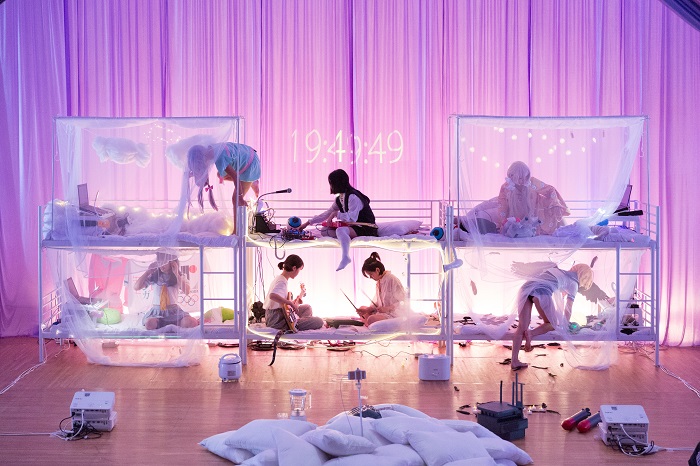
Here Is The Message You Asked For… Don’t Tell Anyone Else 😉 Directed by Sun Xiaoxing. Supplied.
Exploring displacement
Created by Syrian playwright Mohammed Al Attar and director Omar Abusaada, While I Was Waiting is the first Syrian work to be presented at OzAsia in the festival’s 12 year history. Its inclusion in Mitchell’s fourth festival program speaks directly to one of the key themes connecting many of the works – the notion of displacement.
‘Every year the world becomes more and more globalised and this year we’ve really put together a selection of work about how people are either displaced through circumstances outside of their control, but also how some people – particularly artists – might choose to actively displace themselves, in order to discover and extend their practice,’ Mitchell explained.
Such works include Belgian choreographer Sidi Larbi Cherkaoui’s Sutra, developed after the artist spent time in China with the Shaolin monks, and Japanese dancer and choreographer Yui Kawaguchi’s Andropolaroid 1.1, a dazzling hybrid of light installation and dance created after Kawaguchi uprooted herself from Japan and found a new home for herself in an unfamiliar Berlin.
‘When I first saw this work I just watched it and I don’t think I blinked, I don’t think I moved my head or moved in my seat; I was just captivated for 45 minutes straight … And what makes this a really interesting contemporary dance work is that her husband creates an extremely complex lighting design that involves about a hundred drop lights all scattered through the space and they’re programmed to in an inch of their life – there must be about a thousand lighting cues in this production,’ Mitchell laughed.
Also featured in this year’s OzAsia program is the contemporary Chinese theatre production, Secret Love in Peach Blossom Land, an Australian premiere. Mitchell describes it as ‘very much a play about what happens to families and loved ones as a result of the Chinese Revolution, where the Nationalists fled to Taiwan and families were separated. They thought they might reconnect a year later but it was 40 years before actual opportunities arose for their people who were displaced to reconnect with their families.’
Displacement of a different kind is explored in another Chinese production, Here Is The Message You Asked For, a dream-like piece of borderline performance art about contemporary alienation and the digital world.
‘This one is very much a 21st century perspective of how we can effectively make the decision to disappear into a digital existence,’ said Mitchell. ‘There’s no discernible narrative; the audience is basically watching a group of performers going about a digital existence where they’re taking selfies and playing computer games and they’re uploading avatars and they’re texting and chatting with each other, both in text and video,’ said Mitchell.
‘And in terms of decoding this work, it’s much more in the vein of performance art or contemporary practice, where it’s up to you as the audience to really respond to what you’re seeing, and to make your own views. And the director makes no judgement on any of this. He’s not endorsing it, he’s not criticising it, it’s just a choice that young people make and you as an audience basically get to experience that,’ Mitchell said.
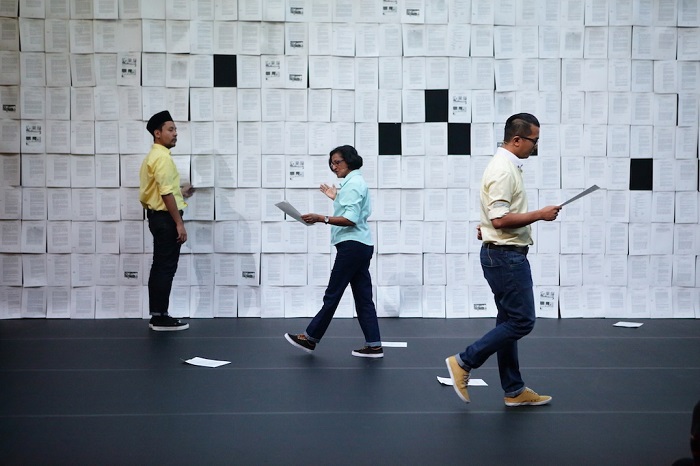
Baling for OzAsia 2018. Photo by Asian Culture Centre.
Connecting past and present
Other works in this year’s OzAsia Festival explores themes of communication, post-colonialism, and coming to terms with the past. Among them is Hello My Name Is…. One of five world premieres in the festival, the one-man play is a poignant exploration of the past and present challenges facing Timor Leste, one of Australia’s closest neighbours.
‘We have the fortunate opportunity of having [Portuguese theatre director, actor and filmmaker and playwright] Paulo Castro living in Adelaide … and here he is looking back towards his own Portuguese roots and recognising that Portugal were the original colonisers of East Timor before the Indonesians,’ said Mitchell.
Together with actor Jose Da Costa, Castro has created a work exploring multiple perspectives – from Indonesia, Portugal, Australia and Timor Leste itself.
‘We hear so much in the headlines about Timor Leste and it’s usually issues around border disputes and oil rights and Indonesia and Australia encroaching on this little country … This is Paulo basically giving Jose Da Costa this platform: “There’s all these big countries that have a lot of influence in the region, but here I am, I’m from Timor Leste, I’m going to tell you what’s what. Here’s our point of view, here’s our story, and it’s your turn to listen.” I think it will be a very strong piece.’
Conversations of a different sort have inspired the Malaysian work Baling, a documentary-style probing of the country’s recent past.
‘Baling is a verbatim theatre experience about a very important but little-discussed two-day dialogue between the withdrawing British colonialists and the Social Democratic Party. And what this play really emphasises is the role of the Communist Party at the time, which was hugely influential and also seen as “the Red Threat”,’ Mitchell explained.
‘So this is a group of artists practicing in Malaysia now, and they have gone and looked at the history of 30-40 years ago and thought, “Actually we’ve kind of conveniently ignored the role of the Communist Party in all of this.” Because it was a three-way dialogue, not a two-way dialogue – not a straight-forward decolonisation.
‘So this is a piece where the current generation of artists are creating works that really encourages people to look back and question and think about different perspectives; to re-think the official lines of history.’
GLOBAL INSPIRATION
Mitchell’s 2018 festival also features the likes of experimental sound collective Speak Percussion, whose Assembly Operation is a collaboration between musician Eugene Ughetti, performance maker Clare Britton, and visual artists Cyrus Tang and Jia Jia Chen.
‘I really respond to contemporary Australian practitioners who are looking globally for inspiration, and in the context of our festival, looking towards the influences of different countries and cultures throughout the Asian region,’ Mitchell explained.
For Assembly Operation the artists have looked to three quite different Chinese traditions: its reputation as birthplace of paper, as the home of the porcelain industry, and as creators and generators of ‘junk electronica’ in the 1980s.
‘I think it’s such a beautiful arc for an approach to contemporary music which references these kinds of ideologies and the influence of Chinese culture, from thousands of years ago to only a decade or two ago. It makes for a very fun and cohesive and interesting work,’ Mitchell concluded.
Adelaide Festival Centre’s 12th annual OzAsia Festival runs from 25 October to 11 November 2018. Full program and ticket details at www.ozasiafestival.com.au.
